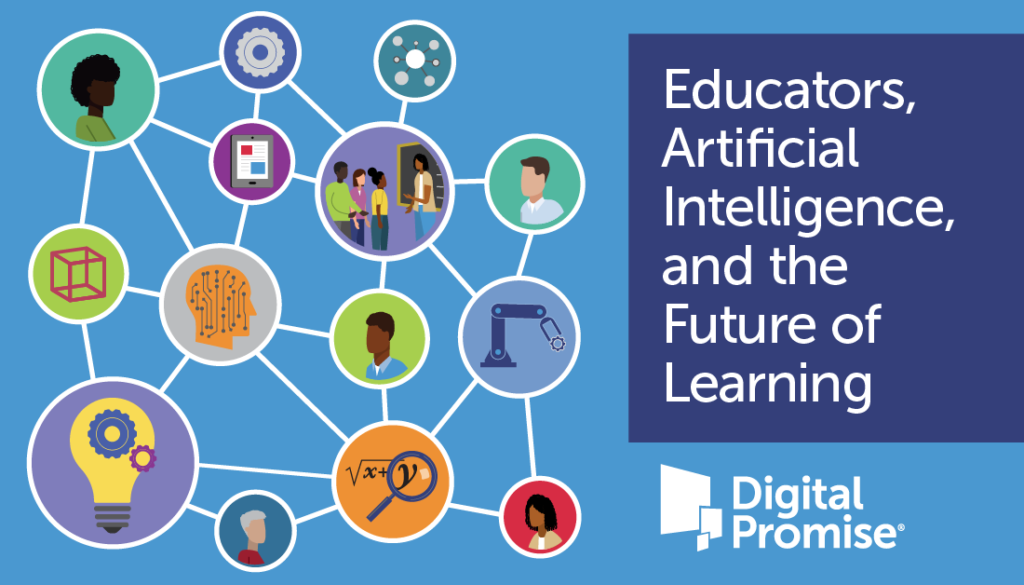Educators, Artificial Intelligence, and the Future of Learning
Watch the recording.
Meet the practitioners:

Sarah Hampton
Middle and Secondary Math Teacher
Twitter: @S_W_Hampton
Sarah’s Statement on AI:
As a leader in Educator CIRCLS, and the wife of a programmer, it’s safe to say I’m somewhat of a technophile. I’m typically and happily an early adopter of ed tech. I’ve witnessed the positive difference the right technology under the right learning conditions can make, creating learning experiences that couldn’t be possible without it. Even so, my initial reaction to artificial intelligence (AI) in education was somewhere between skeptical and antagonistic. Like many teachers I’ve talked with, I’m concerned that using AI might weaken the human connection that’s so important for a healthy school environment. I’m concerned about equity and access issues around technology. I also have serious questions about my students’ privacy. While I remain concerned about these issues, as I started digging into what AI actually is (and isn’t), I’m also learning about the powerful new learning experiences that AI can create that aren’t possible without it. As AI continues to gain funding and attention, we teachers need to keep learning about it so we can offer our voices to the communities developing the tools they want us to use.
One particular paper has influenced me to keep participating in the conversation: Intelligence Unleashed: An argument for AI in education. Consider this:
teachers – alongside learners and parents – should be central to the design of AIEd tools, and the ways in which they are used. This participatory design methodology will ensure that the messiness of real classrooms is taken into account and that the tools deliver the support that educators need – not the support that technologists or designers think they need. Teachers who take part in these processes will gain increased technological literacy, new design skills, and a greater understanding of what AIEd systems can offer.
Luckin and colleagues also talk about the many other expertises involved in educational AIs such as anthropology, biology, computer science, linguistics, philosophy, psychology, neuroscience, sociology, and education. To her list, I would explicitly add the branches of social justice and ethics. For AI in education to be done well, we have to proceed with expert voices from each of these fields. It’s time for a serious risk/benefit conversation about the intended and unintended consequences. I can’t speak to the computer science or psychology aspects of an AI tool, but I have almost 15 years of practical experience with what does and doesn’t work in the classroom that I would like to contribute. For example, I’ve seen educational technology designers with good intentions offload too many pedagogical decisions to algorithms. When you haven’t been trained or had experience teaching, you may not fully understand which of those decisions are consequential for students. On the other hand, I’ve seen technologies developing in collaboration with teachers that improve the learning experience for students and teachers alike. Because specific AIs (like the ones currently being developed for classrooms) can be so powerful, the outcomes will certainly be high impact. It’s crucial that those impacts are positive for our students.
Read more of my thoughts on AI in education:
- Harnessing Educational Data: Discussing Dr. Safiya Noble’s Keynote from Cyberlearning 2019
- Three Visionary Projects Using AI in Education
- Introduction to Artificial Intelligence in Education
- My Students are Deep, Complex, and Beautiful. Assessments Should Be, Too.
- Formative Assessment
- AI and Formative Assessment
- ASSISTments: A Forward-thinking Formative Assessment AI Ready to Use in Your Classroom Today

Diane W. Doersch
Director of Technology, Verizon Innovative Learning Schools at Digital Promise
Twitter: @DoerDi
Diane W. Doersch is the Director of Technology, Verizon Innovative Learning Schools at Digital Promise. Prior to serving at Digital Promise, she was a middle school classroom teacher, Director of Technology, then a Chief Technology and Information Officer for a large Wisconsin School district. With over 34 years in the field of education, Diane holds a BS in Elementary Education and a Masters Degree in Educational Technology. She serves as a CoSN (Consortium of School Networking) Board member and is CETL (Certified Educational Technology Leader) certified. She joined Digital Promise and the Verizon Innovative Learning Schools program to assist in closing the Digital Divide. All opinions expressed are her own and do not represent the stances of the organizations she serves.
Diane’s Statement on AI:
The addition of artificial intelligence (AI) into today’s society may have made our lives easier. Tasks that had previously taken a lot of time and human power to do have become increasingly easier and “just happen” with the addition of behind-the-scenes intelligence of AI. While I appreciate what AI has brought to our personal lives, as an EdTech leader, I continue to be cautious about how we incorporate artificial intelligence into what we do in our classrooms. School district decision-makers from the central office to the classroom level have a responsibility to become AI literate so they can ask discerning questions. We need to ask tough questions and explore topics surrounding student data privacy and security, ethics, and machine learning bias when it comes to AI. Thirty years in the future, I do not want a person to be held back by data that was collected and added to their profile as a student today. We need to ensure that we understand the implications of what we are doing at a societal level, before we implement technologies that may affect the futures of our students. I think the largest question we need to ask is, “If AI is the solution, what is the problem we are trying to solve?”
Favorite EdTech Organizations and their resources on AI:
CoSN (Consortium of School Networking) – Guidance on AI in the Classroom
Future of Privacy Forum – AI & Machine Learning
Educator CIRCLS posts are licensed under a Creative Commons Attribution 4.0 International License. If you use content from this site, please cite the post and consider adding: “Used under a Creative Commons Attribution 4.0 International License (http://creativecommons.org/licenses/by/4.0/).”
Suggested citation format: [Authors] ([Year]). [Title]. Educator CIRCLS Blog. Retrieved from [URL]


